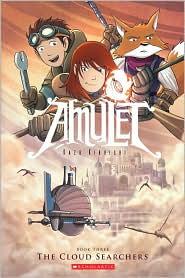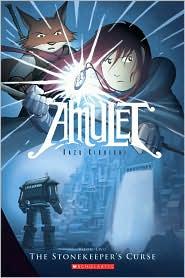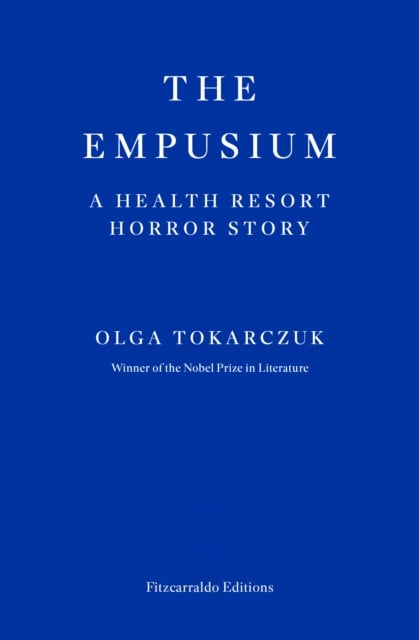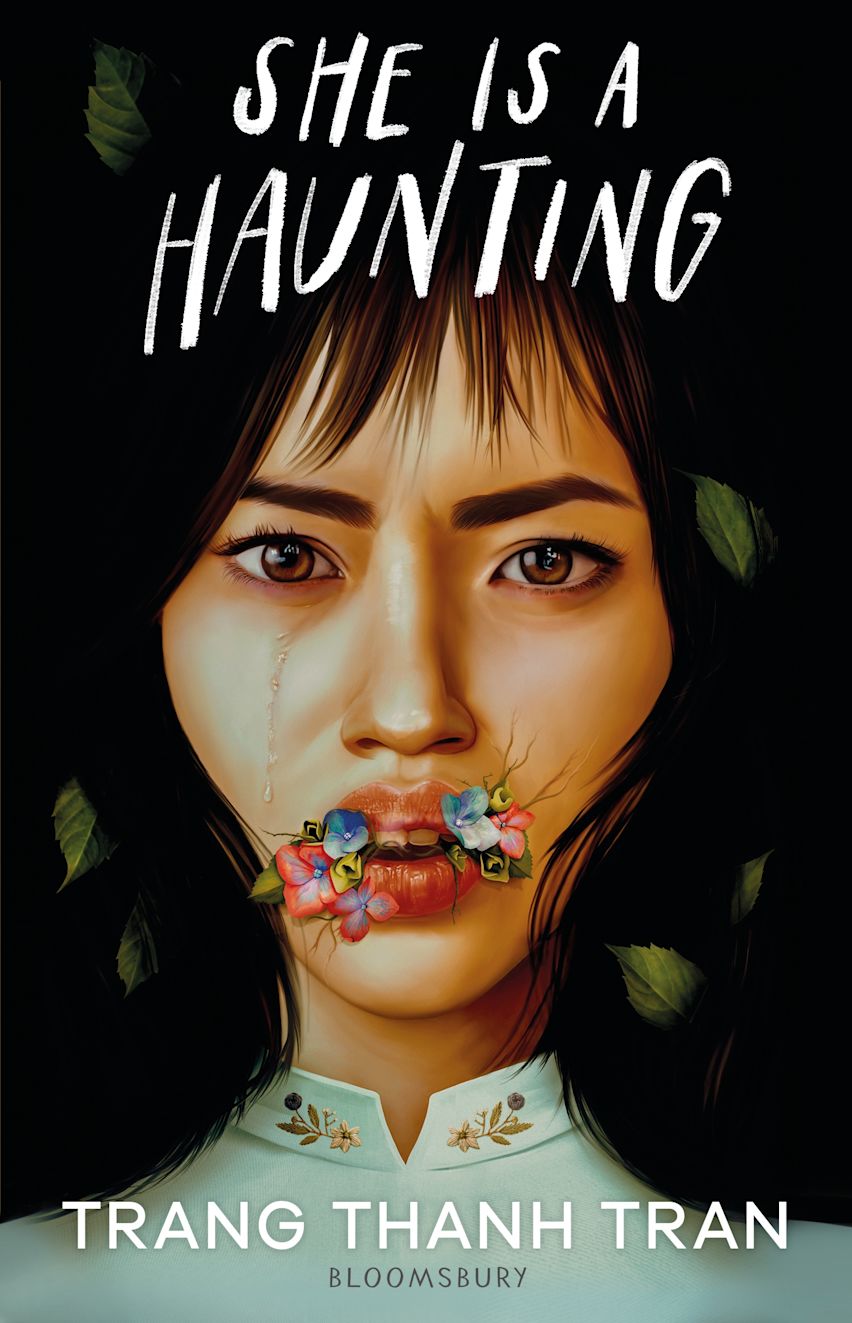nerd teacher [books] <p>started reading</p>

Amulet by Kazu Kibuishi
The Cloud Searchers is a fantasy graphic novel which was written in 2010. It is the third volume in the …
Exhausted anarchist and school abolitionist who can be found at nerdteacher.com where I muse about school and education-related things, and all my links are here. My non-book posts are mostly at @whatanerd@treehouse.systems, occasionally I hide on @whatanerd@eldritch.cafe, or you can email me at n@nerdteacher.com. [they/them]
I was a secondary literature and humanities teacher who has swapped to being a tutor, so it's best to expect a ridiculously huge range of books.
And yes, I do spend a lot of time making sure book entries are as complete as I can make them. Please send help.
This link opens in a pop-up window

The Cloud Searchers is a fantasy graphic novel which was written in 2010. It is the third volume in the …

Emily and Navin's mother is still in a coma from the arachnopod's poison, and there's only one place to find …

The Man in the High Castle is an alternate history novel by American writer Philip K. Dick. Published and set …
They tried to play chess but soon found it boring. In any case, Wojnicz did not like chess. His father had tormented him with it too often. He must have been hoping that learning to play chess would organize Mieczyś’s foggy, unruly mind. After all, chess was played at court, and the emperor himself had shown great fondness for it. This was the entertainment of well-born men, requiring both the intelligence essential for playing it and an ability to see ahead. Wojnicz senior believed that moving around the chessboard in keeping with the rules would introduce an element of automatism into his son’s life that would make the world safe for him, if not friendly. So every day after lunch, just as the body was digesting and a gentle afternoon somnolence was suffusing it, they sat down at the table and set out the chessboard, and his father would let Mieczysław make the first move. Whenever the boy made a mistake, his father came over to his side, stood behind him and tried to steer the child’s attention in a cause-and-effect chain of potential next moves. But whenever Mieczyś was resistant, or “dull,” his father let himself be carried away by anger and left the room to smoke a cigar, while his son had to sit over the chessboard until he had thought up a sensible defense or attack.
Little Mieczysław Wojnicz understood the rules and could foresee a lot, but to tell the truth, the game did not interest him. Making moves according to the rules and aiming to defeat your opponent seemed to him just one of the possible ways to use the pawns. He preferred to daydream, and to see the chessboard as a space where the fates of the unfortunate pawns and other pieces were played out; he cast them as characters weaving complex webs of intrigue, either with or against each other, and linked by all sorts of relationships. He thought it a waste to limit their activity to the checkered board, to leave them to the mercy of a formal game played according to strict rules. So as soon as his father lost interest and went off to see to more important matters, Mieczyś would move the chess pieces onto the steppes of the rug and the mountains of the armchair, where they saw to their own business, set off on journeys, and furnished their kitchens, houses and palaces. Finally his father’s ashtray became a boat, and the pen holders were rafters’ oars, while the space underneath a chair turned into a cathedral where the wedding of the two queens, black and white, was taking place.
Among this race of chess people, he always identified with the knight, who delivered news, made peace between those who were at odds, organized the provisions for expeditions or warned of dangers (such as Józef’s entrance, carpet cleaning or being summoned for lunch). Then, when chided by his father, or sent to his room without supper as a punishment, he would head off with the dignity of a knight—two steps forward and one to the side.
Then Dr. Semperweiss’s gun appeared before his eyes, leaning against the desk, and it brought back images of the time when his father and uncle had taught him to shoot. They hunted pheasants, strange birds that burst out from underfoot and flew heavily into the air with a whir. Their ungainliness was annoying; it prompted one to think them to blame for their own deaths. It was not hard to shoot them, and his uncle often succeeded. But Mieczyś was quite recalcitrant about killing them, and always aimed a centimeter to the left—a minor deception, “pheasant distance” as he called it—an action that neither his uncle nor his father ever noticed, preferring to call the shot “abortive.” Pheasant distance was a defiance strategy similar to reticence, vanishing at the relevant moment or moving out of sight. Mieczysław appeared to take part in the game imposed on him but found a way of escaping it. A slight shift of the sights, imperceptible to others, thwarted the whole performance.
This book is very much a slow burn, and it kind of needs to be in order for the "twist" to make sense. In order to prompt the reader to ask the questions they need to be asking, they really have to follow Mieczysław's thoughts, experiences, and memories.
There is a horror story somewhere, but it's not... very horrific? It kind of feels tacked on in places. It is choreographed, but I think its existence within the story doesn't do much of anything. If anything, it's a very quick catalyst that prompts Mieczysław to live in the way they want. But anything could've been that catalyst, not the horror story that sometimes feels like it's... not even there.
I think if the horror story was utilised better or wasn't there at all, I would've liked this more.

Emily and Navin's mother is still in a coma from the arachnopod's poison, and there's only one place to find …

Emily and Navin's mother is still in a coma from the arachnopod's poison, and there's only one place to find …
This book is really cute! And it's super enjoyable on its own. I'd definitely say give it a go, but do go into it knowing that the audience is primarily aimed at younger teenagers.
Anyway, I've been reading this book with my student, and they are someone whose English fluency is very much in the middle. They have a lot of typical school-based knowledge, but they haven't really had to use English that much outside of class (and even the class is very much lacking in actually using English other than the assignments). Those complaints are slightly irrelevant, but it does contextualise what I'm going to say here since my review is mostly with regards to that element.
This book is really good for kids who are newer to reading in English, and it is one that I'd recommend to people who want to encourage kids to start reading in …
This book is really cute! And it's super enjoyable on its own. I'd definitely say give it a go, but do go into it knowing that the audience is primarily aimed at younger teenagers.
Anyway, I've been reading this book with my student, and they are someone whose English fluency is very much in the middle. They have a lot of typical school-based knowledge, but they haven't really had to use English that much outside of class (and even the class is very much lacking in actually using English other than the assignments). Those complaints are slightly irrelevant, but it does contextualise what I'm going to say here since my review is mostly with regards to that element.
This book is really good for kids who are newer to reading in English, and it is one that I'd recommend to people who want to encourage kids to start reading in English (especially if the goal is for fluency). The images really back up the text to make it easier for people to guess the meanings of words. For those that aren't, the rest of the text often does a good job here, too. It's also a very easy book to read in a group setting (one-on-one with a more fluent person or as a group of learners), as there are a lot of elements to engage with.
I put this here because there is a dearth of information about age appropriate books for teens who are newer to learning English, especially as everything constantly recommends giving them books that are geared for a much younger audience (which often bores them to tears).

In September 1913, Mieczysław Wojnicz, a student suffering from tuberculosis, arrives at Wilhelm Opitz’s Guesthouse for Gentlemen, a health resort …
I'm uncertain how it is that I feel about this book. I don't even know that I can call it enjoyable, though it is incredibly dream-like. There is so much care between the characters, but it also is hard to really enjoy.
It's impossible to really discuss it without spoiling all of it, and I don't particularly feel like writing more. But I can say that the book left me feeling somewhat empty, which I think is honestly the point considering the story itself (an island where things 'disappear', where people who remember are arrested by the Memory Police).
I really love what this book is trying to do, and I really enjoyed so much of the story up to the very end of it because... it was just meh?
Not sure what the editing process was for this book or what conversations took place during it, but it feels very much like Alma was going to play a much stronger role than she did. There was so much choreography in the beginning about Alma being the colonialist monster, trying to revitalise and support colonialism within Vietnam, and trying to exploit Vietnamese people, and trying to rewrite that colonial history to support European histories...
... and then that ball was just kind of dropped for the focus on the house being parasitic. Sometimes the 'Alma' ball was picked back up, but I don't think it was used very well. And I have to wonder if parts of that were …
I really love what this book is trying to do, and I really enjoyed so much of the story up to the very end of it because... it was just meh?
Not sure what the editing process was for this book or what conversations took place during it, but it feels very much like Alma was going to play a much stronger role than she did. There was so much choreography in the beginning about Alma being the colonialist monster, trying to revitalise and support colonialism within Vietnam, and trying to exploit Vietnamese people, and trying to rewrite that colonial history to support European histories...
... and then that ball was just kind of dropped for the focus on the house being parasitic. Sometimes the 'Alma' ball was picked back up, but I don't think it was used very well. And I have to wonder if parts of that were to make white and/or European audiences more comfortable. Or if it was an unintentional pulling back from what was being said, even if there were a lot of strong lines left in.

Jade Nguyen has always lied to fit in. She's straight enough, Vietnamese enough, American enough – at least for this …
My student's pretty quick at reading this. For her English level (she's more in the "intermediate" level with regards to school-based fluency tests but still struggles with using the language as she would normally use it), this is really good.
There've been a lot of new words for her (words like ravine, creek, cavern), but the images also really help her to get an understanding of what they mean.
It's also age-appropriate for a 12-year old, especially one who likes magic-based fantasy. This has been one of the biggest difficulties that I've had in finding books for students, honestly. Most suggestions for 'new readers in English' are for really young kids, and a lot of younger teenagers just don't want to read stories intended for kids between the ages of 6-8 (and, if we're honest, a lot of books 'made for' young children are also things young children tend to …
My student's pretty quick at reading this. For her English level (she's more in the "intermediate" level with regards to school-based fluency tests but still struggles with using the language as she would normally use it), this is really good.
There've been a lot of new words for her (words like ravine, creek, cavern), but the images also really help her to get an understanding of what they mean.
It's also age-appropriate for a 12-year old, especially one who likes magic-based fantasy. This has been one of the biggest difficulties that I've had in finding books for students, honestly. Most suggestions for 'new readers in English' are for really young kids, and a lot of younger teenagers just don't want to read stories intended for kids between the ages of 6-8 (and, if we're honest, a lot of books 'made for' young children are also things young children tend to side-eye quite a lot).